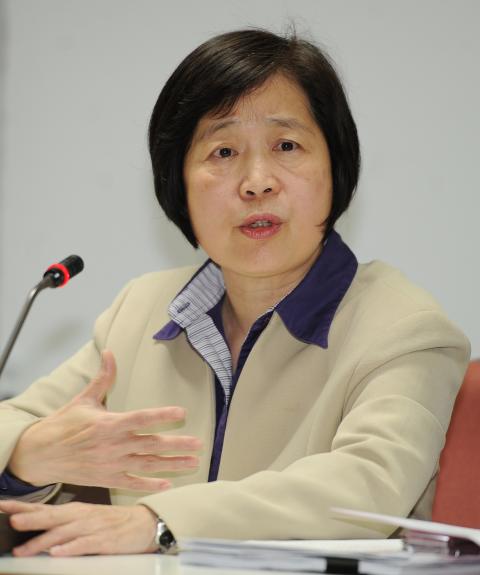|
Nominee slammed over US
green card
FRESH CONTROVERSY: DPP and KMT lawmakers said
Chen Be-yue’s US permanent residency makes her entirely unsuitable as a nominee
to the Council of Grand Justices
By Shih Hsiu-chuan and Vincent Y. Chao / Staff Reporters

Chen Be-yue, the head of the
Judicial Yuan’s Judicial Personnel Study Center, is a nominee to the Council of
Grand Justices.Apr 09, 2011
Photo: Liao Chen-huei, Taipei Times
Lawmakers from both the Chinese
Nationalist Party (KMT) and Democratic Progressive Party (DPP) yesterday
expressed disapproval of Council of Grand Justices nominee Chen Be-yue (陳碧玉)
because of the US green card she once held during her stint as a Supreme Court
judge.
A number of KMT lawmakers yesterday called on Chen to decline President Ma Ying-jeou’s
(馬英九) nomination, while DPP urged Ma to nominate a new list altogether.
“As President Ma has not yet sent the nominations to the legislature for
approval, they might as well [drop] the entire list,” said DPP Legislator Gao
Jyh-peng (高志鵬), in light of the controversies surrounding Ma’s grand justice
nominees.
Following the sudden change of grand justice nominee Supreme Court Judge Shao
Yen-ling (邵燕玲), who declined Ma’s nomination after a media uproar over her role
in a controversial child molestation ruling, Chen was the latest nominee to find
herself at the center of controversy.
Insisting she made no secret of first holding US citizenship and then a US green
card, Chen told a press conference on Thursday that she relinquished the US
citizenship that she obtained in 1992 in October 1996, soon after the Judicial
Yuan reinstated her as a judge, a position she resigned from in 1983.
Chen said she acquired a US green card in January 2008 when she served in the
Supreme Court because she needed to fly to the US to help her daughter and
two-year-old granddaughter. She said she renounced the permanent residence
status in September the following year.
At the press conference, she showed a passport page and US immigration documents
proving that she gave up the green card in September 2009, before she was
-considered for the grand justice role.
The Central Personnel Administration said in a press statement that Chen had not
broken any laws because the Nationality Act (國籍法) does not prohibit people who
have permanent residence status in foreign countries from serving in public
office and that Chen had renounced her US nationality when she served as a
judge.
The Nationality Act stipulates that holders of dual citizenship must surrender
their foreign citizenship before assuming public office.
However, KMT Legislator Ting Shou-chung (丁守中) yesterday said it was a “serious
flaw” that a Taiwanese Supreme Court judge was a US green card holder.
“I can’t bring myself to vote and approve her nomination,” he said.
“That Chen held dual nationality and a US green card showed that she has no
faith in Taiwan, whatever her motivations,” Ting added. “[Her eligibility] to be
grand justice is in question.”
KMT caucus whip Hsieh Kuo--liang (謝國樑) said it was “inappropriate to a certain
extent” to confirm a grand justice nominee who once held either US nationality
or a US green card.
“I have heard people talking about the matter. People have some concerns, and I
am thinking about this,” KMT Legislator Lu Shiow-yen (盧秀燕) added. “As grand
justices hold the highest position in the judiciary, the legislature has to
screen their eligibility with the strictest attitudes and by applying the
highest standard.”
KMT Legislator Chiu Yi (邱毅), meanwhile, demanded that Judicial Yuan President
Rai Hau-min (賴浩敏) resign to take responsibility for having recommended Chen and
Shao.
The row surrounding Chen has also led to renewed questions about the US green
card that Ma also once held, with DPP lawmakers calling the two cases “very
similar.”
“The type of president we have defines the type of judge he nominates. Under his
values, he thinks nothing of the fact that [Chen Be-yue] once held a US green
card,” DPP Legislator Tsai Huang-liang (蔡煌瑯) said. “She’s unsuitable as a
nominee.”
Standing by its nomination of Chen however, the Presidential Office yesterday
argued that Chen had given up her US permanent residency.
Presidential Office spokesman Lo Chih-chiang (羅智強) quoted Ma as saying that the
nomination of Chen was a “proper decision” because she had given up her US
residency and did not cover up the truth.
Another grand justice nominee, Lo Chang-fa (羅昌發), who was also reported by
media yesterday as having held permanent residency from Canada, also gave up the
residency before the nomination, Lo said.
NO VIOLATION
“Both nominees did not violate any laws and clearly stated the situation in the
nomination reference … It’s not fair to accuse her of having moral flaws,” he
said.
The nomination task force gave great reviews of Chen and the other three
nominees and the president hoped the public would focus on the overall
performance of the nominees, Lo added.
Under Taiwan’s judicial system, grand justices are authorized to interpret the
Constitution and unify the interpretation of laws and ordinances.
TERM TIMES
The terms of four of the 15 incumbent Constitutional Court Grand Justices — Hsu
Pi-hu (徐璧湖) Lin Tzu-yi (林子儀), Hsu Tzong-li (許宗力) and Hsu Yu-hsiu (許玉秀) —will end
on Sept. 30.
According to the Additional Articles of the Constitution, the president should
nominate and appoint, with the consent of the Legislative Yuan, four new
justices to fill the posts.
NOMINATIONS
Aiming to have the new justices take the bench on Oct. 1 as required by law, Ma
has previously said that he hopes the legislature will deal with nominations
before its summer recess at the end of May.
ADDITIONAL REPORTING BY MO YAN-CHIH AND CNA
|
![]()
![]()
![]()